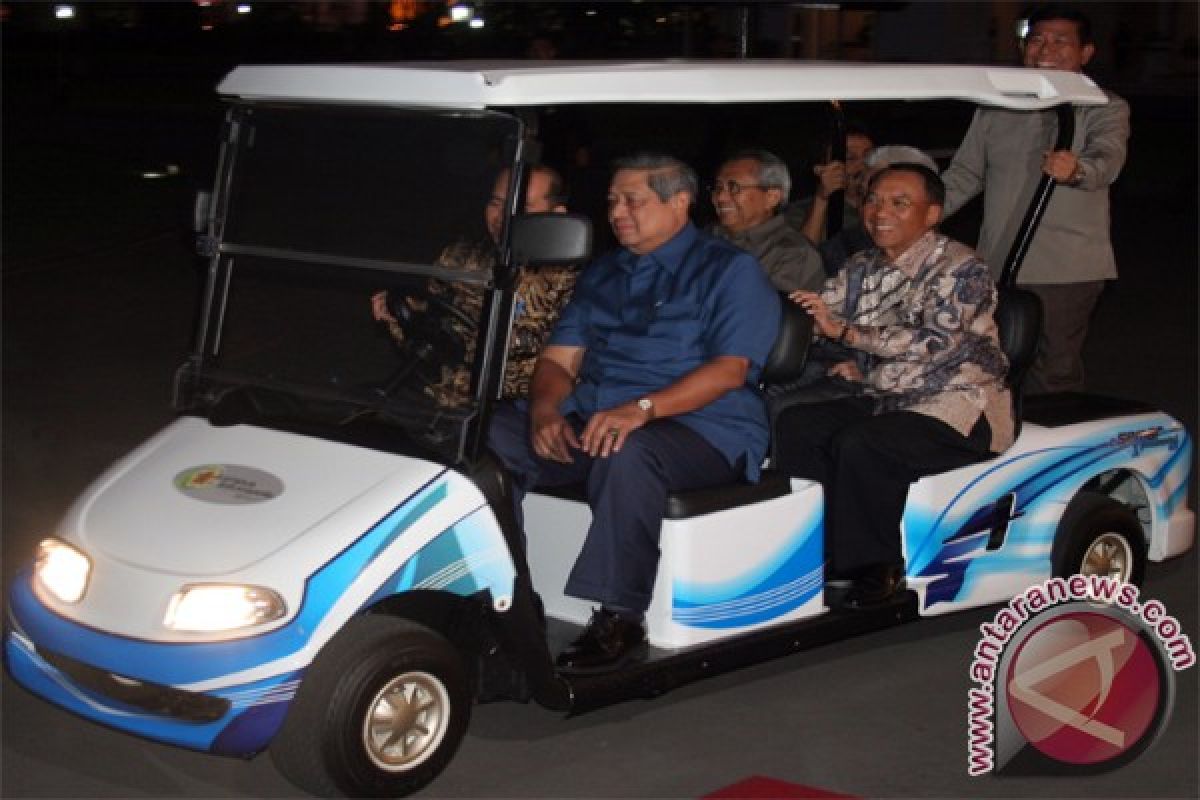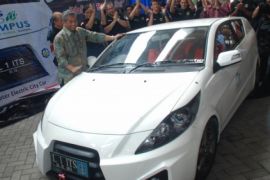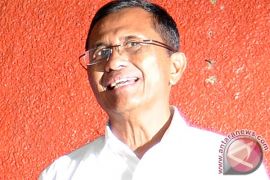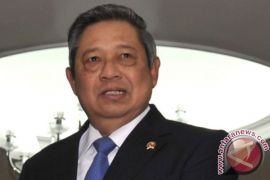"We almost suffered a lack of sleep and could not teach."Jakarta (ANTARA News) - Never before has the electric car been discussed so seriously as it was last Friday (May 25) afternoon at a meeting in Yogyakarta State Palace, involving high-level officials, with President Susilo Bambang Yudhoyono himself being the initiator and leader of the discussion.
More than half of the cabinet ministers attended the discussion and rectors of top state universities - UI, ITB, ITS, UNS, UGM and others - were invited.
It was these rectors who presented the results of the study about the electric car. I myself presented a five-member "Pendawa Putra Petir" team that is now developing the prototype of a national electric car.
Under the supervision of minister of education Muhammad Nuh and minister of research and technology Gusti Muhammad Hatta, the rectors were surprisingly able to present comprehensive and complete results of their study within the tight deadline the President had given them.
President Yudhoyono had earlier invited the rectors to the Presidential palace in Jakarta to discuss whether it was realistically possible to produce a national electric car. He then asked them to conduct an academic study, giving them just two and a half months for it.
So, when President Yudhoyono asked for the results of their study on Friday, they were ready. It seemed both the President and the rectors had a lot of enthusiasm. It was like a collaboration of Anang and Ashanti (popular newly-wed artist couple).
This revealed that institutes of higher learning were themselves determined to produce something historic.
The electric car concept could be developed so quickly because these higher-learning institutes had long been conducting thorough research, studies and tests.
Even students are able to build a car. I have tried the ones created by ITS, ITB and UGM students.
They have for years hoped the results of their studies and researches would not end up just on paper. They have long dreamed of turning their studies into realities for the nation.
They even suspected that big business interests "killed their baby while still in the womb".
So, when President Yudhoyono sought a national electric car, the rectors` spirits became just like a flame being sprayed with gasoline.
"We almost suffered a lack of sleep and could not teach (thinking about the project)" an electronic engineering doctorate student from Yogyakarta-based Gajahmada Univeristy (UGM) said.
President Yudhoyono seemed to be very satisfied with the presentation by the education minister and the UGM rector who represented the rectors at the meeting.
President Yudhoyono had also expressed his strong commitment to the continuation of the project at the meeting, drawing applause from the rectors.
That the conclusion of the academic exposition by the rectors will lead to the birth of a national electric car is a must. The word "a must" must be written in capital letters to show how serious it is. When is the right time to produce it? The answer is now.
The word "now" must also be underlined to remind us that we must not lose momentum. If Indonesia delayed this time again, the rectors said, the country would repeat the dark chapter in its history where it would merely be a car market and all efforts would have gone in vain.
"In terms of technology, human resources, market and industry, we are capable of doing it," Agus Darmadi, an electronics professor of UGM representing the rectors, said in his presentation.
The rectors` presentation found an echo in the subsequent presentation of the Pendawa Putra Petir team of five Indonesians who are ready to develop the car.
The five, who were selected among more than 1,000 people to script the birth of a national electric car, had to meet three main requirements: academic capability, industrial experience and passion.
One of them, Dasep Ahmadi, is an engineering graduate from the Bandung Institute of Technology (ITB) and also from an overseas educational institute. He has long been involved in the car industry and is now able to produce precision machinery as well as export it.
If precision machinery is mastered, all kinds of machinery will be easy to make. Dasep has been developing three prototypes of city electric cars, which are almost ready and could be driven in a month`s time. The shape is similar to the Toyota Avanza and I have visited his workshop twice.
Another member of the team is Danet Suryatama, an engineering graduate from the Surabaya Institute of Technology (ITS) who received a doctorate degree from the Michigan University in the US and has been working for more than 10 years in the US car industry.
When the meeting with the President took place, Danet had just arrived from the US and had no time to even take a bath before the meeting, which he could have missed because his flight had been delayed.
I have visited his workshop in Yogyakarta where the car will be manufactured. Danet is preparing a luxurious electric car to "beat the notion that electric cars are cheap cars".
He presented his car design, which could make even Ferrari fans jealous. The car will be ready in two months` time.
Danet has arrived in the country to dedicate his life to the nation after working in the US for 20 years. His motherland has called the man from Pacitan, East Java, back home.
Meanwhile, Ravi Desai, another member, born in and graduated from the state of Gujarat in India, is an energy expert who is focusing on energy conversion.
He is now working to convert an old car into an electric car. When I visited his project in Serpong last week, I saw two Timor sedans being overhauled to have their engines replaced with electric engines. In two months` time the "new Timor car" will hit the street.
Another Pandawa Putra Petir is Mario Rivali, a specialist in electric motorbikes who has graduated from British and German universities and had also studied at ITB, has already made an electric bike.
The bike has even passed certification tests and been patented.
Mario does not like his product being compared with electric bikes being sold in the country now. His electric bike to be named "Abyor" is supposed to be a class apart.
However, the team`s products cannot be called national unless they have adequate locally manufactured components. Therefore, they would need the youngest Pendawa member, "Sadewa". He is still very young and his real name is a secret. When asked by President Yudhoyono to speak up, he only spoke what was necessary.
Born in Padang, West Sumatra, he is an expert in developing motor components. He already has dozens of patented motor products abroad and he is also ready to return home to become a pioneer in the domestic motor component industry.
He has been in a developed country for 14 years and is now ready to return home to serve his motherland.
"A car needs 150 motors. So, a million cars will need 150 million motors. All have been imported so far. A big sugar plant may need 1,000 motors. Everything needs a motor but we have not yet been able to make it so far," he said.
This young man from West Sumatra will change the situation. He is in the process of building a team and is recruiting reliable personnel from various universities. In the next three months, his motor prototype would be ready in Bandung. Sadewa will certainly give priority to motors for the national electric car.
Seeing the spirit of them all, President Yudhoyono could not hide his emotions. His face and words represented the overall mood of the meeting that afternoon, which was a mixture of pride and enthusiasm.
The President heralded the birth of a new era with new regulations and incentives. Industry minister MS Hidayat also seemed to be in high spirits and had expressed his commitment to help in every way possible.
At the end of the meeting, the President called for the new regulations and incentives to be in place within the next three months, drawing a big applause from everyone yet again.
*) Dahlan Iskan is Indonesian enterprises minister.
(Uu.H-YH/INE/KR-BSR)
Reporter: by Dahlan Iskan *)
Editor: Priyambodo RH
Copyright © ANTARA 2012







